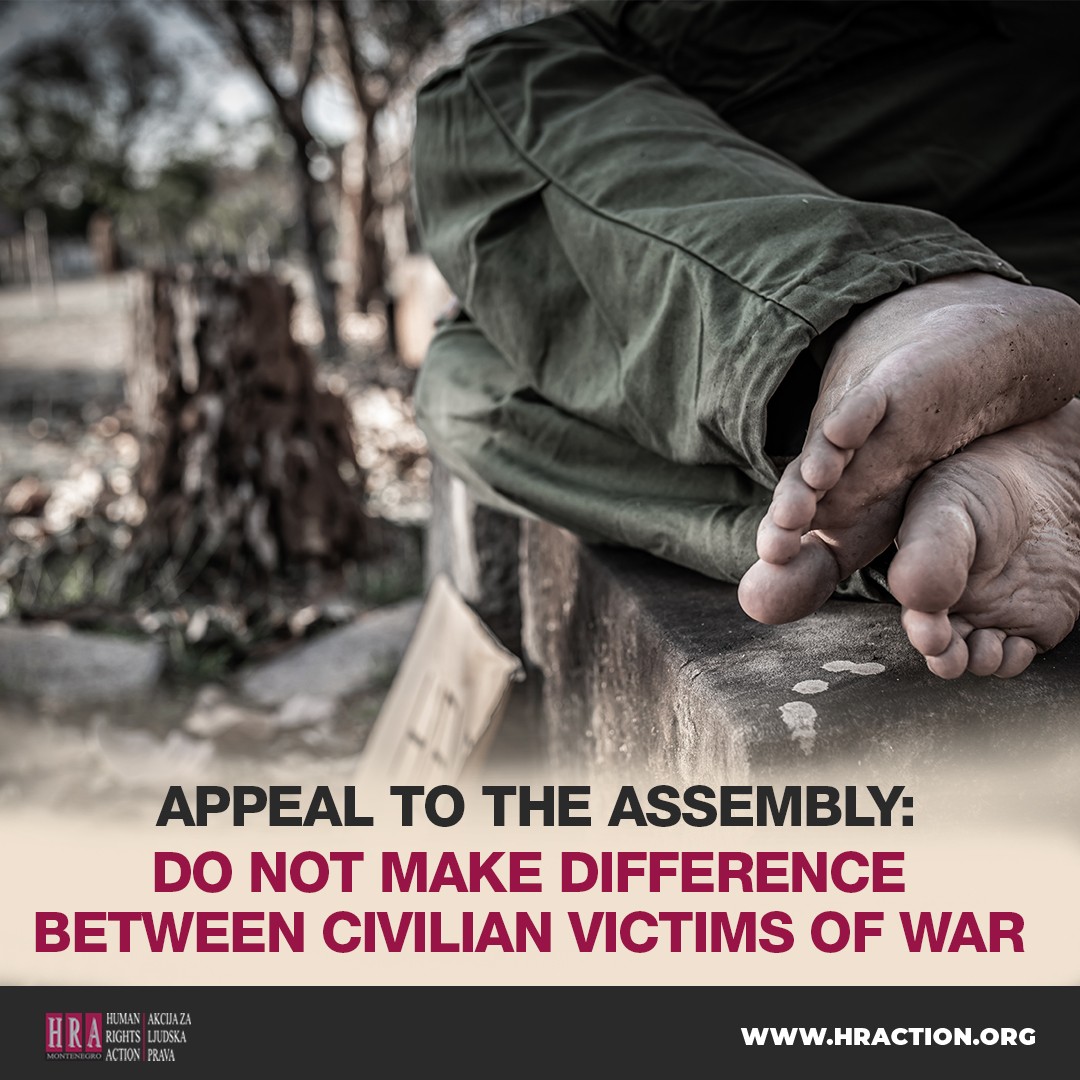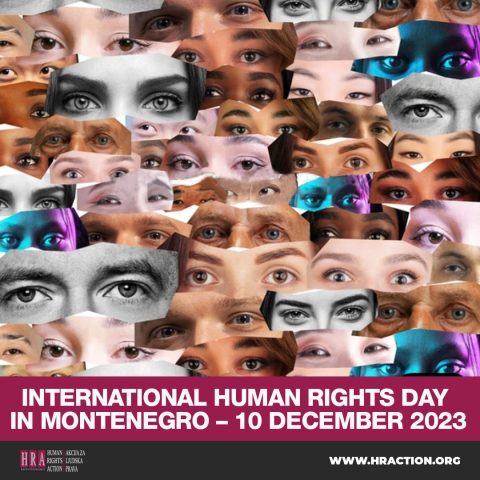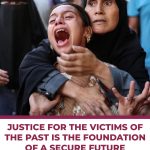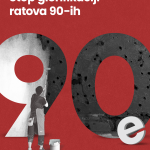
32 YEARS SINCE THE JNA AGGRESSION ON THE DUBROVNIK AREA AND THE SHELLING OF THE OLD TOWN
06/12/2023
THE ASSEMBLY OF MONTENEGRO SHOULD TREAT ALL CIVIL VICTIMS OF WAR EQUALLY
22/12/2023INTERNATIONAL HUMAN RIGHTS DAY IN MONTENEGRO – 10 DECEMBER 2023

About the World
The world is welcoming the International Human Rights Day with 32 armed conflicts. The bloodiest among them is the war between Israel and Hamas, where more than 18,000 people were killed in just two months – two-thirds of them women and children in Gaza. February marks two years since Russia’s invasion of Ukraine. In that war, the only one that is being waged on European soil, it was assessed that more than 10,000 civilians have been killed to date, while the casualties among members of the armed forces on both sides are estimated at tens of thousands. Massive war crimes negating human rights were committed in all these conflicts.
The Universal Declaration of Human Rights was adopted 75 years ago today, as the first document that brought about a catalogue of human rights at the international level, consisting of civil, political, economic, social and cultural human rights. The first article of the Universal Declaration reads as follows: All human beings are born free and equal in dignity and rights. They are endowed with reason and conscience and should act towards one another in the spirit of brotherhood. Although Yugoslavia later accepted all important human rights treaties, in 1948 it abstained from voting on the Universal Declaration, along with the USSR, the Byelorussian SSR, the Ukrainian SSR, Czechoslovakia, Poland, Saudi Arabia and the Union of South Africa.
This year also marks the 25th anniversary of the adoption of the Declaration on Human Rights Defenders, which recognised the important role and responsibility of non-governmental organisations, individuals, groups and institutions for the protection of democracy and the promotion of human rights. This Declaration stipulates that everyone has the right to protection while reacting or protesting against actions or omissions of the state that lead to human rights violations, that is, to violence perpetrated by individuals or groups.
The theme of this year’s International Human Rights Day is “Freedom, Equality and Justice for All”.
About Montenegro in General
In Montenegro, after a 10-month standstill in the work of the National Assembly and 8 months of work of the Government in a technical mandate, the Speaker of the Assembly of Montenegro, Andrija Mandić, was elected on 30 October, while the new Government of Prime Minister Milojko Spajić was constituted on 31 October. Since 20 May, Montenegro has had a new President, Jakov Milatović, who replaced Milo Djukanović who held the highest state positions for approximately three decades.
It is positive that none of the laws adopted by the dissolved convocation of the Assembly came into force, because both the previous and the current President refused to sign them. They were thus all returned to the new Government for consideration, which provides a new opportunity for the improvement of statutory solutions and their alignment with international standards.
Both the technical Government of Dritan Abazović and the new Government of Milojko Spajić decided to support Saudi Arabia as the host country of the world exhibition EXPO, in exchange for donations to Montenegro for the education sector, despite that country’s massive and systematic violations of human rights, the most famous of which was the murder of a dissident journalist Jamal Khashoggi in 2018 at the Saudi Arabian consulate in Istanbul. Twenty one non-governmental organisations working in Montenegro opposed this commercial approach to human rights.
Montenegro has been a candidate country for membership in the European Union for 13 years now. Negotiations have been stagnant for the last two.
Please read below about the protection of human rights before the Constitutional Court and in the judiciary, about the application of the absolute prohibition of torture, about dealing with the past, investigations of attacks on journalists, about social rights, the rights of persons with disabilities, the application of the constitutional prohibition of causing or inciting hatred and intolerance, about human rights education and the protection of human rights defenders in Montenegro, which are all topics the Human Rigths Action has been dealing with. In the upcoming year, the state will have to do a lot to fulfil the well-founded recommendations of international and non-governmental organisations in these areas, the fulfilment of which we have been waiting for too long.
About the Constitutional Court
After five months, the work of the Constitutional Court got unblocked in February by the election of three judges (Snežana Armenko, Dragana Djuranović, Momirka Tešić), while the Court was completed at the end of November with the election of the seventh judge Faruk Resulbegović, after more than three years.
There are 2,594 cases pending before the Constitutional Court, 87% (2,269) of which are constitutional appeals. Of the constitutional appeals, there are 8 that remained unresolved since 2018. Considering the standard from the case law of the European Court of Human Rights, the right to an effective legal remedy before the Constitutional Court has already been violated in the procedures upon appeals from 2018, 2019 and 2020, of which there are 571, or 22% of the total number of cases. There are also 325 proposals and initiatives for the review of constitutionality and legality that are still awaiting decisions, and two such cases are from 2016. It is necessary to provide the Constitutional Court with more advisers to help the judges make up for the backlog that was caused by the deputies’ refusal to elect the missing judges in a timely fashion. The HRA believes that the next constitutional reform should increase the number of judges of the Constitutional Court from 7 to 9.
A positive novelty on the website of the Constitutional Court is the publication of decisions on constitutional appeals, with key words so that the decisions can be more easily searched. However, the Constitutional Court is still not publishing the order of deciding in cases, or priorities, so citizens do not know when they can expect the Court’s decision.
At the end of October, the Constitutional Court made a controversial decision to abolish the right of women from Article 17, paragraph 1 of the Law on Pension and Disability Insurance to retire two years before men (at the age of 64 and after 15 years of employment) by a majority of votes (4:2), treating it as discrimination. The HRA believes that it was not necessary to make such a drastic decision, which denies positive discrimination against women. The problem of discriminatory forcing of female judges and state prosecutors to leave their positions at the age of 64 could have been solved differently, by adequately supplementing the law. Not all women who want to retire at the age of 64 – or men, who now require 40 years of employment to retire – had to be harmed because of this. We appeal to the legislator to make it possible for everyone who so chooses, to retire at the age of 64 and after 15 years of employment, with the provision that it would be specified that for judges and prosecutors this would apply as a possibility, not as a mandatory condition for termination of office.
About the Judiciary
The European Commission (EC) assessed the state of the judicial system as a “continuation of a deep institutional crisis”. Key positions are still occupied by acting officials: Supreme State Prosecutor, President of the Supreme Court, and three members of the Judicial Council from the ranks of distinguished lawyers who are starting their 10th year in office even though the Constitution limits their mandate to four years, which – according to the EC – “undermines the democratic legitimacy of the Judicial Council”.
The situation in the basic courts is alarming; they lack more than a fifth of judges, i.e. 22%, or 32 persons. In practice, this is reflected in the promptness of the courts and respect for the right to a trial within a reasonable time. Hearings are scheduled more than four months apart, decision-making is delayed, and the resolution of issues which are crucially important to citizens is being postponed indefinitely. Such a state of affairs was caused also by the passivity of the Judicial Council, which without justification kept 11 candidates for judges who had successfully completed initial training on hold for almost five months, at the time when there were as many as 36 vacant positions in the basic courts. Also, the Testing Commission, composed of the members of the Judicial Council, is slowing down the process even further because of its failure to schedule testing two and three months after the deadline for the submission of applications. By amending the Law on the Judicial Council and Judges, it is necessary, among other things, to shorten the duration of training for judges and make it more effective.
This year too, the EC criticised the Judicial Council and the Prosecutorial Council for their lack of proactivity; the EC also stated that it was necessary that they improve the transparency of their work by publishing reasoned decisions on the election, promotion and determination of responsibility of judges and state prosecutors; that there has been no progress in increasing the accountability of judges and state prosecutors for, among other things, ineffective work of commissions for determining ethical responsibility, and the lack of consistency of both councils in sanctioning holders of judicial offices for failure to provide data on their assets and income.
This year was marked also by a tragic event in March, when a person died after detonating a hand grenade at the entrance to the Basic Court building in Podgorica. Five people were physically injured, while four sought help at the Emergency Centre for suffered stress. This event reminded of the negligence of the competent governments and their ministers of justice who, for more than two decades, failed to apply the law and solve the issue of securing judicial institutions in Montenegro. Also, an organised criminal group dug a tunnel to the basement of the High Court in Podgorica, which still hosts the archive with evidence. It was established that several pieces of evidence – namely, firearms – were taken out of the archive, but the final finding on the damages is not yet known.
The HRA report on punishment for the violation of health measures during the Covid-19 pandemic showed a markedly unequal treatment of citizens, who were sanctioned differently for the same actions, e.g. curfew violation and driving in a car – they were imposed prison terms, fines and suspended sentences, while criminal charges were sometimes even dismissed after persons paid a certain amount for humanitarian purposes. In a few cases, prosecutors withdrew from criminal prosecution without offering any explanation.
In principle, to ensure a uniform penal policy in all areas and the equality of citizens before the law, it is necessary to adopt guidelines for punishment in both criminal and misdemeanour proceedings. As regards punishment for the violation of the often disproportionate Covid-19 measures, whose legality was particularly disputable in criminal proceedings, the HRA proposed that the Government, following the example of Slovenia, pass a law on amnesty and return the money to all who were punished.
Prohibition of Torture
The ineffectiveness of investigations of police ill-treatment is still one of the key problems in the protection of human rights and freedoms in Montenegro. As the European Committee for the Prevention of Torture (CPT) concluded in this year’s report, despite being repeatedly warned, Montenegro has not managed to suppress the culture of ill-treatment by the police because it has not efficiently prosecuted and appropriately punished the police officers responsible for it, including the chiefs who must be held accountable for the actions of those they lead. Former Minister of the Interior Filip Adžić publicly protected police inspectors accused of torture, unlawfully refusing to suspend them for several months. Such public promotion of impunity may have influenced the fact that, this year, almost five times more criminal charges for acts of torture (107) were filed than last year, against 161 police officers. Although three and a half years have passed, there is still no indictment for extorting a statement from Jovan Grujičić by use of severe violence in the case of the “bomb attacks” on the house of Duško Golubović and the bar “Grand”, even though international experts have confirmed that he was a victim of torture. In that case, the High State Prosecutor’s Office overturned the decision to reject criminal charges filed by state prosecutor Maja Knežević four times, before the case was finally handed over to another prosecutor.
We expect concrete results from the new authorities with the aim of adequately punishing all those responsible for torture, as well as the introduction of additional statutory guarantees such as mandatory recording of interrogations conducted in the police and the state prosecutor’s office, reduction of the 24-hour period before a person deprived of liberty has to be brought before the state prosecutor, mandatory psychiatric expert examination of alleged victims of torture, toughening of punishments for acts of torture, etc.
Dealing with the Past
This year too, the Government did not take a strategic approach to dealing with the past.
The Special State Prosecutor’s Office is still not showing a proactive approach to war crimes investigations. There were no new indictments, no investigations were launched, and there is a lack of regional cooperation. There is only one pending war crime trial, for which the indictment was filed two years ago when Bosnia and Herzegovina assigned the case to Montenegro.
The last convocation of the Assembly voted for the discriminatory institute “civilian victims of war”, which found itself among the provisions of the voted on, but not adopted, Draft Law on Amendments and Supplements to the Law on Veterans and Disability Protection. This legal institute, which implies the right to monetary compensation, is prescribed in a way that allows the right to be exercised only by the victims of the armed conflict with NATO in Montenegro, but not by other families of civilian victims from Montenegro who suffered as a result of armed conflicts in Croatia, Bosnia and Herzegovina or Kosovo after the end of the state of war. It is necessary for the new parliamentary convocation to correct the omission and provide all civilian victims of the wars of the 1990s with the right to compensation. Positive steps in the regulation of legislation have been made regarding the issue of command responsibility and the use of obtained evidence before the Hague Tribunal, which should be adopted soon.
For the first time after 31 years, the President of Montenegro Jakov Milatović apologised to the families of the victims of “Deportation” for the illegal arrest and extradition of BiH refugees to the army of the Serbian Republic of BiH in 1992. However, despite last year’s public promises made by the former Minister of the Interior, there is still no monument to the victims of deportation, and it is not known whether any work is being done to erect it.
This year, the Government showed no interest in the HRA initiative for the rehabilitation and compensation of political prisoners from Montenegro who spent time on Goli Otok.
About Investigations into Attacks on Journalists
Montenegro continues to be burdened by unsolved murders and attempted murders, physical attacks, threats and attacks on media property, which limit freedom of expression. We commend the indictment for wounding journalist Olivera Lakić in 2018, and we also expect an indictment for ordering her murder in 2020, which luckily was never attempted because the perpetrator in the meantime decided to cooperate with the prosecution in exchange for the protected witness status. We remind that the background of this attack, or previous attacks on her and her family, has never been revealed.
There has been no progress in the investigations of other key attacks on journalists. Despite the announcement, the Government of Montenegro did not hire a foreign expert to review the previous investigation into the murder of Duško Jovanović. There has been no progress in the investigation of the Jovanović case and it turned out that the state prosecutors had not investigated everything that was pointed out by the Human Rights Action, in its report back in 2016, and by the Commission for Monitoring Investigations of Attacks on Journalists in 2022. Sixteen years have passed since the attempted murder of journalist Tufik Softić in Berane. The new executive power has the obligation to create conditions for the detection of perpetrators, and for their punishment.
About the Socio-Economic Rights
This year too, Montenegro did not fulfil the recommendations of the UN Committee for Economic, Social and Cultural Rights from 2014 to provide an appropriate standard of living for the socially vulnerable – especially the unemployed, the elderly and persons with disabilities. Although slightly increased, the amount of social aid is still four times lower than the price of the minimum consumer basket. It does not ensure survival, but rather encourages the gray economy and the exploitation of the poorest. There are no precise data on the number of poor and homeless people, or people who do not have adequate housing or access to basic infrastructure and services such as water, heating, sanitation and electricity. The Strategy for the fight against poverty has not been adopted and, judging by the Government’s Mid-Term Work Programme for the period 2022-2024, its development is not even planned. Adequate conditions for the protection of the homeless have not been achieved and the several years long problem of people living in the psychiatric hospital in Kotor because they have nowhere else to live, has not been resolved. No secondary legislation of any kind has been adopted that would explain how the homeless are being taken care of, what services are available to them and in what way.
About the Rights of Persons with Disabilities
The recommendations of the UN Committee on the Rights of Persons with Disabilities from 2017 have not been fulfilled either, especially with regard to the necessary reform of guardianship over and decision-making on behalf of a person, which prevents people with disabilities from freely making decisions about their own lives. The practice of depriving people of their business capacity has continued, and the main form of care for persons with psycho-social disabilities is to place them in institutions. Approximately 46% of the patients of the Special Psychiatric Hospital in Kotor are still the so-called ‘social patients’, whose hospital treatment is no longer needed but they continue to live in the Hospital because the state has nowhere else to put them. There are no adequate conditions for the treatment of children who require urgent hospitalisation. Although the Government had planned to adopt the Strategy of Deinstitutionalisation and Development of Services for Life in the Community 2023-2026 (with the Action Plan for 2023) in the 4th quarter of 2022, that Strategy has not yet been adopted and it is not known whether the working group charged with its development has been formed. Not all courts, state prosecutor’s offices and other public facilities are physically accessible to people with disabilities.
Constitutional Prohibition of Causing or Inciting Hatred and Intolerance
Hate speech in public space has not abated this year either. In addition to the posts of citizens on social networks, representatives of state bodies are also prone to this kind of speech. For example, MP Milutin Djukanović from the New Serbian Democracy disparaged and dismissed the statements of long-time activist Ivana Vujović as those of “someone’s wife”, while the mayor of the municipality of Nikšić, Marko Kovačević, sang the following song at a celebration: “The Turks are wailing, their wives are wailing, Serdar Janko is waving his saber; strike, brothers, Serbship is ours”. He participated with other representatives of the municipal authorities in the memorial service for Dragoljub Draža Mihajlović, a collaborator of the fascist occupiers during the Second World War, whose units committed terrible crimes against the Muslim population in the north of Montenegro.
Hate speech promoted by politicians has severe consequences for life in a multi-ethnic community such as Montenegro, with especially negative consequences for children. In April, hooligans in Bar attacked the children of an athlete from Sarajevo, quite possibly motivated by ethnic hatred. No indictment has been filed in that case yet.
In the past year, we have recorded 15 cases of public hate speech that were reported by the media. The last involved the publication of a vulgar and misogynistic book by Dr. Vojislav Šešelj (in Serbia) about a professor at the University of Montenegro and former member of the Parliament of Montenegro. The fact that the entire Montenegrin government, the President, and many MPs, political parties and representatives of the civil society condemned it, is encouraging.
Three misdemeanour and 7 criminal proceedings were initiated. As regards proceedings that were initiated against the fan group of the football club Sutjeska from Nikšić called “Vojvode” due to the cry “Knife, wire, Podgorica!”, according to the state prosecutors there were no grounds to initiate criminal prosecution for the commission of the criminal offence prosecuted ex officio, so the case has been assigned to the Misdemeanour Court in Podgorica (10 cases were formed in all). This year, the Appellate Court of Montenegro passed only one final decision confirming the judgment of the High Court in Podgorica in which the mayor of the municipality of Nikšić, Marko Kovačević, was acquitted of the criminal offence of inciting national, racial and religious hatred from Article 370, paragraph. 2 in connection with paragraph 1 of the Criminal Code of Montenegro by stating: “I don’t think that genocide happened in Srebrenica”.
The State Prosecutor’s Office needs additional training on making a distinction between freedom of expression and hate speech. For example, it prosecuted historian Boban Batrićević for legitimate criticism of the statements made by a priest of the Serbian Orthodox Church, but did not prosecute death threats made to the editor-in-chief and deputy editor of the Antena M portal. The same training is necessary for the officers of the Police Administration who are processing misdemeanour charges filed with the courts despite the fact that they are not always lawyers.
It is necessary for the Government to take a strategic approach to suppressing causing or inciting hatred and intolerance, which would ensure new legal measures and practical policies to suppress hate speech and other acts motivated by hatred.
Human Rights Education
The number of reports of peer violence among children in Montenegro is increasing. The Human Rights Action, the Centre for Civic Education and the Centre for Women’s and Peace Education ANIMA have asked the Ministry of Education to re-introduce Civic Education as a compulsory subject in primary and secondary schools because, among other things, the experience of teachers who teach this subject shows that children who attend this course tend to show, as a rule, a greater degree of tolerance, and better know and respect their own rights and the rights of others.
Protection of Human Rights Defenders
In January, the coalition for the rights of LGBTIQ+ persons “Ravnopravno”, consisting of 17 NGOs, condemned the untrue accusations the Prime Minister Dritan Abazović used to attack the Parents Association, and reminded that civil society organisations and activists in Montenegro are finding themselves under the attack of certain politicians from the government and the opposition, as well as from certain political movements in the making, any time they express disagreement with their public activities or lack of action.
Minister Filip Adžić called the efforts of the Human Rights Action to combat police torture “pressure”, “harassment”, “an attempt to destroy institutions for the sake of obtaining grants”, “influence aimed at stopping the fight against organised crime” etc, placing us in the same group with criminals. This kind of narrative towards the civil sector encouraged other members of the Police Administration to publicly threaten civil activists, so the acting commander of the Anti-Terrorist Unit, Petar Knežević, recently threatened the “shameful non-governmental organisations” that – as he said – “throw mud” at him, by sending the following message to their activists: “When you go to the toilets of foreign services, do not speak cheaply about me because that has its price”. In his threats, he referred to operational knowledge, which is contrary to the Code of Police Ethics. The Minister of Internal Affairs has not yet spoken out about this case, nor is it known that any measures have been taken against Knežević.
The most severe attack this year was suffered by the activist of the NGO Ecopatriotism from Nikšić, Boško Pavićević, who was attacked and seriously injured by several hooligans because he warned them and filmed them as they were abusing animals and disturbing the public peace in a square in Nikšić. Earlier, a misdemeanour case was initiated against Ecopatriotism activist Ivana Čogurić because she demonstratively left bags with collected garbage in front of the door of the municipal service in Nikšić, while the municipal police passed her telephone number (personal information) to the person she had reported for violating the law. In both cases, the state authorities efficiently responded to the reports of the activists.
We remind once again that the UN Declaration on Human Rights Defenders requires the state and all its representatives to understand and respect the role of associations and individuals who are engaged in the protection of human rights, and to protect their legitimate right to criticise the authorities and all those who violate human rights.







 English
English Montenegrin
Montenegrin